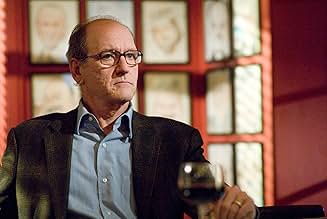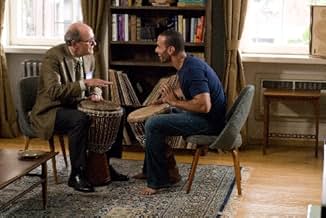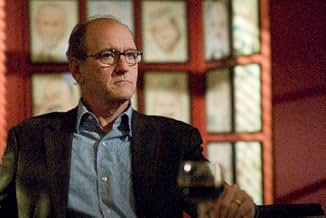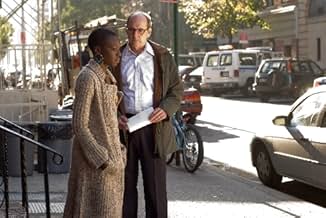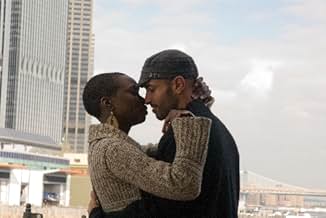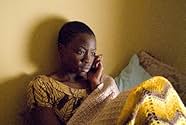A college professor travels to New York City to attend a conference and finds a young couple living in his apartment.A college professor travels to New York City to attend a conference and finds a young couple living in his apartment.A college professor travels to New York City to attend a conference and finds a young couple living in his apartment.
- Nominated for 1 Oscar
- 19 wins & 35 nominations total
- Director
- Writer
- All cast & crew
- Production, box office & more at IMDbPro
Featured reviews
The Visitor strings together unlikely events in the lives of a professor and his visitors. Remarkably sincere and touching, the unimaginable events feel natural.
Awkward Connecticut economics professor Walter Vale (Richard Jenkins) has essentially checked out from his job, his personality and his life. Walter is forced by circumstance to return to his abandoned New York City apartment. When he returns he meets Tarek (Haaz Sleiman) and Zainab (Danai Jekesai Gurira), who have taken up unauthorized residence in his apartment. Tarek and Zainab teach Walter to live again, to come out of his shell and remind him how unfair life can be.
Writer and director Thomas McCarthy wrote all of the characters in The Visitor with almost contradictory personality attributes which gives them each a complex humanity.
McCarthy wrote Walter Vale painfully dull and bumbling but it was Richard Jenkins who also makes Walter charming and heart breaking. In nearly every setting, Jenkins both makes the audience scrunch their faces at Walter's social inadequacies while simultaneously bringing out our Florence Nightingale instincts. As Walter changes in the course The Visitor, Jenkins keeps the essential qualities of Walter but changes him in surprising ways.
The supporting cast isn't any less remarkable in The Visitor. There is a master of life, a vision of unabashed sadness and an embodiment of sensual motherly warmth. Haaz Sleiman, who plays Tarek, is (damn foxy) full of life as Tarek. His esprit fills Tarek, the audience, the other characters and actors with such vitality. Danai Jekesai Guria plays Zainab, Tarek's girlfriend. So much of Zainab is forlorn despondent dejection. Rich with beautiful hardness and unnaturally attractive pain, Danai Jekesai Guria made Zainab so hard to watch but impossible to pull your eyes away from. Hiam Abbass plays Mouna, Tarek's mother. Her fear is palpable but she never loses her intangible sensuality.
The most remarkable part of The Visitor is the way it organically shows the way life can change un-expectantly, unfairly and without warning and does it with real, raw emotion. Just when you think you've figured out what the movie is about, you slapped with a new reality. It is frightening, timely and angering. Even the ending, which is not the typical movie ending, is emotive in a subtle and realistic way. I was not overwhelmed or underwhelmed by the movie, I was perfectly whelmed; a task indeed.
The pacing is the one complaint I have with The Visitor. The editing could have been much better. There are beautiful scenes sometimes drawn out to boredom. Scenes that were the actors' timing is slightly off are only highlighted by the shoddy editing. The Visitor is an artsy movie but Tom McArdle checked out completely in a few of the scenes.
Slow bits aside, The Visitor is a rewarding film with rich characters, beautiful acting and complexities that might make those people who are quick to tears, cry.
Awkward Connecticut economics professor Walter Vale (Richard Jenkins) has essentially checked out from his job, his personality and his life. Walter is forced by circumstance to return to his abandoned New York City apartment. When he returns he meets Tarek (Haaz Sleiman) and Zainab (Danai Jekesai Gurira), who have taken up unauthorized residence in his apartment. Tarek and Zainab teach Walter to live again, to come out of his shell and remind him how unfair life can be.
Writer and director Thomas McCarthy wrote all of the characters in The Visitor with almost contradictory personality attributes which gives them each a complex humanity.
McCarthy wrote Walter Vale painfully dull and bumbling but it was Richard Jenkins who also makes Walter charming and heart breaking. In nearly every setting, Jenkins both makes the audience scrunch their faces at Walter's social inadequacies while simultaneously bringing out our Florence Nightingale instincts. As Walter changes in the course The Visitor, Jenkins keeps the essential qualities of Walter but changes him in surprising ways.
The supporting cast isn't any less remarkable in The Visitor. There is a master of life, a vision of unabashed sadness and an embodiment of sensual motherly warmth. Haaz Sleiman, who plays Tarek, is (damn foxy) full of life as Tarek. His esprit fills Tarek, the audience, the other characters and actors with such vitality. Danai Jekesai Guria plays Zainab, Tarek's girlfriend. So much of Zainab is forlorn despondent dejection. Rich with beautiful hardness and unnaturally attractive pain, Danai Jekesai Guria made Zainab so hard to watch but impossible to pull your eyes away from. Hiam Abbass plays Mouna, Tarek's mother. Her fear is palpable but she never loses her intangible sensuality.
The most remarkable part of The Visitor is the way it organically shows the way life can change un-expectantly, unfairly and without warning and does it with real, raw emotion. Just when you think you've figured out what the movie is about, you slapped with a new reality. It is frightening, timely and angering. Even the ending, which is not the typical movie ending, is emotive in a subtle and realistic way. I was not overwhelmed or underwhelmed by the movie, I was perfectly whelmed; a task indeed.
The pacing is the one complaint I have with The Visitor. The editing could have been much better. There are beautiful scenes sometimes drawn out to boredom. Scenes that were the actors' timing is slightly off are only highlighted by the shoddy editing. The Visitor is an artsy movie but Tom McArdle checked out completely in a few of the scenes.
Slow bits aside, The Visitor is a rewarding film with rich characters, beautiful acting and complexities that might make those people who are quick to tears, cry.
A genuinely unexpected gem. As he proved with his first film as a director and screenwriter, 2003's "The Station Agent", Thomas McCarthy knows how to convey the fine line between solitude and loneliness in his characters' lives with an emotional preciseness that doesn't call attention to itself. It's not surprising that McCarthy is an actor because he's able to capture the very subtle nuances in behavior in actors that make his work feel like Edward Hopper paintings come to life. As a result, you pay attention to a simple gesture, a passing glance, a resigned sigh. This time, his protagonist is Walter Vale, an enervated, middle-aged economics professor at a Connecticut college. Widowed and wholly lacking in professional motivation, he begrudgingly accepts an assignment to go to an academic conference at NYU and present a paper on globalization he really didn't write.
Coming back to a Greenwich Village flat he rarely uses, he is surprised to find a couple living there. Not squatters but unfortunate victims of a rental scam, they turn out to be illegal aliens, a Syrian percussionist named Tarek and his girlfriend Zainab, a Senegalese who makes and sells handcrafted jewelry. As withdrawn from life as Walter is, he slowly finds himself bonding with the couple and lets them stay indefinitely. Zainab is slow to trust Walter, but Tarek and Walter become close over a mutual love of African drums. As his wife was a famous classical pianist, Walter had been futilely attempting to find musical inspiration since her death. However, just as this charming tale of world harmony plays out, it comes back to harsh reality when Tarek is arrested and taken to a detention center in Queens for deportation. What McCarthy does from this point forward is show how sadly restrictive the post-9/11 environment has made immigration laws and how there is no recourse to be found under the constant surveillance of a bureaucratic government protected by the latitude of the Patriot Act.
None of this is hit over our heads with a politically motivated sledgehammer. Far from such polemics, the story singularly focuses on Walter's emergence of purpose in helping Tarek. When Tarek's mother Mouna arrives from Detroit, McCarthy adeptly shows how Walter's closeness to Tarek translates without condition to her. It's a moving transformation of a formerly lonely man finding intimacy in the most unlikely situation. In a once-in-a-lifetime role, character actor Richard Jenkins brings heart and soul to Walter in the most economical manner. Best known as the ghostly father in HBO's "Six Feet Under", he has worked steadily in films for three decades, his most memorable turn being the gay FBI agent high on heroin in David O. Russell's "Flirting with Disaster". With his constant look of resignation on the verge of revelation, Jenkins gives a wondrously poignant, often dryly funny performance that deepens as the story evolves.
Haaz Sleiman and Danai Gurira are terrifically winning as Tarek and Zainab, and they make their bonding with Walter more than credible. As Mouna, Hiam Abbass is no stranger to persevering maternal roles as she brought her particular brand of strength to Hany-Abu Assad's controversial "Palestine Now" and Eran Riklis' family dramedy, "The Syrian Bride". In response to Walter's fumbling overtures, she affectingly conveys her character's resolute stillness and gradual blossoming. There are brief cameos by comic actor Richard Kind as Walter's unctuous neighbor, Deborah Rush as a wealthy and ignorant customer of Zainab's, and Broadway legend Marian Seldes as Walter's failed piano teacher. At first, I thought the film's title was blandly generic in describing those who are here from other lands, but I realize now that the visitor is really Walter as he discovers his soul. The last shot is memorable and captures the fury of his passion with potent force. Strongly recommended.
Coming back to a Greenwich Village flat he rarely uses, he is surprised to find a couple living there. Not squatters but unfortunate victims of a rental scam, they turn out to be illegal aliens, a Syrian percussionist named Tarek and his girlfriend Zainab, a Senegalese who makes and sells handcrafted jewelry. As withdrawn from life as Walter is, he slowly finds himself bonding with the couple and lets them stay indefinitely. Zainab is slow to trust Walter, but Tarek and Walter become close over a mutual love of African drums. As his wife was a famous classical pianist, Walter had been futilely attempting to find musical inspiration since her death. However, just as this charming tale of world harmony plays out, it comes back to harsh reality when Tarek is arrested and taken to a detention center in Queens for deportation. What McCarthy does from this point forward is show how sadly restrictive the post-9/11 environment has made immigration laws and how there is no recourse to be found under the constant surveillance of a bureaucratic government protected by the latitude of the Patriot Act.
None of this is hit over our heads with a politically motivated sledgehammer. Far from such polemics, the story singularly focuses on Walter's emergence of purpose in helping Tarek. When Tarek's mother Mouna arrives from Detroit, McCarthy adeptly shows how Walter's closeness to Tarek translates without condition to her. It's a moving transformation of a formerly lonely man finding intimacy in the most unlikely situation. In a once-in-a-lifetime role, character actor Richard Jenkins brings heart and soul to Walter in the most economical manner. Best known as the ghostly father in HBO's "Six Feet Under", he has worked steadily in films for three decades, his most memorable turn being the gay FBI agent high on heroin in David O. Russell's "Flirting with Disaster". With his constant look of resignation on the verge of revelation, Jenkins gives a wondrously poignant, often dryly funny performance that deepens as the story evolves.
Haaz Sleiman and Danai Gurira are terrifically winning as Tarek and Zainab, and they make their bonding with Walter more than credible. As Mouna, Hiam Abbass is no stranger to persevering maternal roles as she brought her particular brand of strength to Hany-Abu Assad's controversial "Palestine Now" and Eran Riklis' family dramedy, "The Syrian Bride". In response to Walter's fumbling overtures, she affectingly conveys her character's resolute stillness and gradual blossoming. There are brief cameos by comic actor Richard Kind as Walter's unctuous neighbor, Deborah Rush as a wealthy and ignorant customer of Zainab's, and Broadway legend Marian Seldes as Walter's failed piano teacher. At first, I thought the film's title was blandly generic in describing those who are here from other lands, but I realize now that the visitor is really Walter as he discovers his soul. The last shot is memorable and captures the fury of his passion with potent force. Strongly recommended.
It's only about twice a decade that I run across a movie that really impresses me. It's usually an obscure film that I entered with no expectations -- but left blown away by its cinematic achievement.
I just saw such a film tonight. "The Visitor" A small independent production with zero-advertising. Made by Tom McCarthy whose prior film, "The Station Agent," was an imperfect, character-absorbed drama.
The star of this movie is an actor (Richard Jenkins) whom you'll recognize from his numerous roles as minor-characters, most notably the dead-patriarch in "Six Feet Under." All of the other actors are completely unknown, but notably talented.
The appeal of this film is its story. An aged, listless academic, whose wife died earlier, floats through his uninteresting life until something happens to jar him. What happens next is unexpected, interesting and poignant. It would ruin the story if I told it to you, so you'll have to trust me. Suffice it to say it's a story of rebirth.
Like most of my favorite films, it has comedy, pathos, surprises, authenticity and a philosophical examination of what it means to be human. In short, everything, even politics.
And the presentation is skillfully-crafted. McCarthy demonstrates what was good about his prior work without dragging it down with what was bad about that work.
See it.
I just saw such a film tonight. "The Visitor" A small independent production with zero-advertising. Made by Tom McCarthy whose prior film, "The Station Agent," was an imperfect, character-absorbed drama.
The star of this movie is an actor (Richard Jenkins) whom you'll recognize from his numerous roles as minor-characters, most notably the dead-patriarch in "Six Feet Under." All of the other actors are completely unknown, but notably talented.
The appeal of this film is its story. An aged, listless academic, whose wife died earlier, floats through his uninteresting life until something happens to jar him. What happens next is unexpected, interesting and poignant. It would ruin the story if I told it to you, so you'll have to trust me. Suffice it to say it's a story of rebirth.
Like most of my favorite films, it has comedy, pathos, surprises, authenticity and a philosophical examination of what it means to be human. In short, everything, even politics.
And the presentation is skillfully-crafted. McCarthy demonstrates what was good about his prior work without dragging it down with what was bad about that work.
See it.
Richard Jenkins' portrayal of lacklustre professor Walter is beautifully underplayed, somnambulistically acting out the various roles of his life as a stilted economics professor. The beginning scenes unravel artfully and launch into the story where Walter is abruptly introduced to the young couple (Tarek and Zainab).
The ensuing impromptu friendship that develops is well conceived. The wariness and strong-will of Zainab contrasts well against her boyfriend Tarek's more forthright relaxed nature. The interplay between Tarek, Zainab and Walter is at times awkward, at times touching. I felt that these quality performances go a long way towards forgiving the unlikely set of circumstances (and responses) that brought and kept the three characters together.
I thought the scenes where Walter learns to play the djembe were beautifully played; Walter's awkward but curious initiation to drumming and the (unexpected) expression of pure joy on his face while playing added believable depth to an otherwise restrained and austere performance.
Walter's exposure to the djembe perhaps underpins the films well-intentioned message that our lives are enriched by living side-by side with other cultures. Good intentions aside, I think the second half of the film suffers because of the filmmaker's heavy-handed desire to go further and promote the idea that 'good people suffer in the hands of US immigration control'.
In my opinion producing a film with any agenda is problematic because it requires a degree of rationalisation and simplification which works against interesting characterisation. Life is very rarely straightforward and when it is straightforward, it isn't interesting to watch.
In the case of the second half of The Visitor, I felt that this overarching requirement to show the characters in a positive light removed any sense of conflict the characters might have otherwise possessed. The story no longer had a life of it's own and seemed to involve reaching a predetermined conclusion through any route possible.
The character of Tarek's (caring / strong / dignified) mother, fell short of the high-expectations that I'd built-up during the first half of the film. I felt her portrayal was lacking and I didn't fully understand the function her character played. The subsequent relationship that develops between Walter and Mouna seemed gratuitous and left too many questions unanswered.
After watching this and Tom McCarthy's first film (The Station Agent), it's clear to me that McCarthy is an accomplished director / writer - who perhaps excels at directing character-based stories. I think this film suffers because halfway through the film McCarthy attempts to move focus from a rich exploration of character, to a slightly ill-conceived issue-based drama.
Nevertheless, I thoroughly enjoyed The Visitor.
The ensuing impromptu friendship that develops is well conceived. The wariness and strong-will of Zainab contrasts well against her boyfriend Tarek's more forthright relaxed nature. The interplay between Tarek, Zainab and Walter is at times awkward, at times touching. I felt that these quality performances go a long way towards forgiving the unlikely set of circumstances (and responses) that brought and kept the three characters together.
I thought the scenes where Walter learns to play the djembe were beautifully played; Walter's awkward but curious initiation to drumming and the (unexpected) expression of pure joy on his face while playing added believable depth to an otherwise restrained and austere performance.
Walter's exposure to the djembe perhaps underpins the films well-intentioned message that our lives are enriched by living side-by side with other cultures. Good intentions aside, I think the second half of the film suffers because of the filmmaker's heavy-handed desire to go further and promote the idea that 'good people suffer in the hands of US immigration control'.
In my opinion producing a film with any agenda is problematic because it requires a degree of rationalisation and simplification which works against interesting characterisation. Life is very rarely straightforward and when it is straightforward, it isn't interesting to watch.
In the case of the second half of The Visitor, I felt that this overarching requirement to show the characters in a positive light removed any sense of conflict the characters might have otherwise possessed. The story no longer had a life of it's own and seemed to involve reaching a predetermined conclusion through any route possible.
The character of Tarek's (caring / strong / dignified) mother, fell short of the high-expectations that I'd built-up during the first half of the film. I felt her portrayal was lacking and I didn't fully understand the function her character played. The subsequent relationship that develops between Walter and Mouna seemed gratuitous and left too many questions unanswered.
After watching this and Tom McCarthy's first film (The Station Agent), it's clear to me that McCarthy is an accomplished director / writer - who perhaps excels at directing character-based stories. I think this film suffers because halfway through the film McCarthy attempts to move focus from a rich exploration of character, to a slightly ill-conceived issue-based drama.
Nevertheless, I thoroughly enjoyed The Visitor.
Thomas McCarthy's second film, after the charming Station Agent, is a quiet, hard look at several different aspects of humanity. The Visitor centers on Walter Vale, masterfully portrayed by Richard Jenkins. A solemn economics teacher, he spends his time pretending to write on his book and learn piano. Walter finds himself in New York on business and runs into two illegal immigrants, Tarek (Haaz Sleiman) and Zainab (Danai Jekesai Gurira who were tricked into renting his apartment. Tarek and Walter strike up an unusual friendship when Tarek begins to teach Walter how to play the drums. This is interrupted by Tarek's arrest and detention while it is decided whether he will be deported or not. Soon Walter is joined by Tarek's mother Mouna.
The Visitor is a wonderful piece that brings together some of the best performances I have seen this year. McCarthy disarms us with wry humor, quiet wit, and a meditative pace and before we know it we've found ourselves immersed. When the credits have rolled, however, it's not so much the plot that stays with us as the characters. The most perplexing and fascinating character is Walter Vale. The transformation undergone by his character is done perfectly, the changes are noticeable but not intrusive. Tarek and Zainab who have only a handful of scenes together, manage to share incredible chemistry. Hiam Abbass, as Tarek's mother, deepens the connection between the characters, almost filling in the cracks to complete a whole.
At first glance, the Visitor seems political in nature. Thomas McCarthy has actually said that was not true, the deportation aspect of the film actually came into the script later in the process. The Visitor, instead of political aspirations, merely seeks to show us that anyone can change your life and that change is all around us and is indeed a good thing.
In the end, Thomas McCarthy succeeds in bringing capturing the humor, tragedy, and change of the human experience in his new film. Brought to life by incredibly stirring performances, particularly Richard Jenkins, the Visitor is the most emotionally powerful film to light up the big screen in a while.
The Visitor is a wonderful piece that brings together some of the best performances I have seen this year. McCarthy disarms us with wry humor, quiet wit, and a meditative pace and before we know it we've found ourselves immersed. When the credits have rolled, however, it's not so much the plot that stays with us as the characters. The most perplexing and fascinating character is Walter Vale. The transformation undergone by his character is done perfectly, the changes are noticeable but not intrusive. Tarek and Zainab who have only a handful of scenes together, manage to share incredible chemistry. Hiam Abbass, as Tarek's mother, deepens the connection between the characters, almost filling in the cracks to complete a whole.
At first glance, the Visitor seems political in nature. Thomas McCarthy has actually said that was not true, the deportation aspect of the film actually came into the script later in the process. The Visitor, instead of political aspirations, merely seeks to show us that anyone can change your life and that change is all around us and is indeed a good thing.
In the end, Thomas McCarthy succeeds in bringing capturing the humor, tragedy, and change of the human experience in his new film. Brought to life by incredibly stirring performances, particularly Richard Jenkins, the Visitor is the most emotionally powerful film to light up the big screen in a while.
Did you know
- TriviaFor The Visitor (2007), Tom McCarthy won the 2008 Independent Spirit Award for Best Director, while Richard Jenkins was nominated for Best Actor at the 81st Academy Awards®.
- GoofsIn New York airport, the flight was announced as "flight to Syria", although it should actually name the airport (Damascus), not the country. But more importantly, there is no direct non-stop flight from New York to Syria.
- Quotes
Prof. Walter Vale: We are not helpless children!
- Crazy creditsBaldwin's L2 grand piano
Details
- Release date
- Country of origin
- Languages
- Also known as
- Du Khách
- Filming locations
- Production companies
- See more company credits at IMDbPro
Box office
- Budget
- $4,000,000 (estimated)
- Gross US & Canada
- $9,443,451
- Opening weekend US & Canada
- $86,488
- Apr 13, 2008
- Gross worldwide
- $18,213,880
- Runtime
- 1h 44m(104 min)
- Color
- Sound mix
- Aspect ratio
- 1.85 : 1
Contribute to this page
Suggest an edit or add missing content


